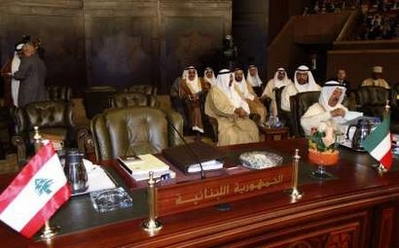 DAMASCUS (AFP) – Syrian President Bashar Al-Assad denied on Saturday meddling in Lebanon as he hosted an Arab summit boycotted by half of the region’s leaders, many of whom blame Damascus for the political crisis in Beirut. I would like to make a point with regards to Syrian interference in Lebanon. It is the contrary which is true because pressure has been exerted on Syria for over a year to interfere in Lebanon’s affairs" but we have refused to do so, Assad said.
DAMASCUS (AFP) – Syrian President Bashar Al-Assad denied on Saturday meddling in Lebanon as he hosted an Arab summit boycotted by half of the region’s leaders, many of whom blame Damascus for the political crisis in Beirut. I would like to make a point with regards to Syrian interference in Lebanon. It is the contrary which is true because pressure has been exerted on Syria for over a year to interfere in Lebanon’s affairs" but we have refused to do so, Assad said.
"They have their nation, their institutions, their constitution," he said in an opening address to the leaders of Algeria, the Comoros, Kuwait Lybia, Mauritania the Palestinian Authority, Qatar, Sudan, Tunisia and the United Arab Emirates.The Saudi, Egyptian and Jordanian leaders stayed away after Washington urged its allies to think twice before attending the summit of the 22-member Arab League, accusing Syria of blocking the election of a new president in Lebanon.
The seat earmarked for Lebanon itself was left vacant, but Syria trumpeted the absence of US allies as a triumph over Washington’s influence. "They (the United States) did their best to prevent the summit but they failed," Syrian Foreign Minister Walid Muallem told reporters ahead of the two-day gathering. "Their aim is to divide the Arab world."Several Arab officials have expressed frustration at the West’s "interference" in Arab affairs.
"There has been US pressure on Arab countries to reduce their participation," Libyan Foreign Minister Abdel Rahman Shalgham told reporters in Damascus on Saturday."We as Arabs do not interfere in European summits. It has become a farce and this situation must be remedied by a joint Arab effort," he said. Egypt sent a junior minister, while powerhouse Saudi Arabia and Jordan were represented by their ambassadors to the Arab League.
"There will be no trace of the United States on the summit’s work or agenda," Muallem told his counterparts on Thursday in a preparatory meeting for the summit.
In Beirut, Lebanese university students at a demonstration tore up portraits of Assad and branded him an "assassin".
Hundreds of students took part in the protest near the downtown Beirut tomb of former premier Rafiq Hariri, assassinated in a 2005 car bombing widely blamed on Syria, which has denied involvement.
At the opening of the summit, Arab League chief Amr Mussa stressed that regional stability depended on a solution to the Lebanese crisis.
"The election of a Lebanese president … and the friendship between the two neighbouring and brotherly countries, Syria and Lebanon, are essential for the return to calm and stability of our region," Mussa said.
An Arab League initiative calls for the election of army chief General Michel Sleiman as president, the formation of a national unity government in which no single party has veto power and a new electoral law.
Among the absentees, Saudi Foreign Minister Prince Saud al-Faisal on Saturday called on Syria to make a "positive move" to help implement the Arab plan.
On Thursday, Muallem had urged Riyadh to use its influence to help solve the problem. "Saudi Arabia must use its influence over the majority in Lebanon to help find a solution," he said.
In a televised address on Friday ahead of the summit, Lebanese Prime Minister Fuad Siniora said his government had decided to boycott the meeting because of Syrian meddling in his country’s affairs.
"Syria played a leading role to exacerbate the crisis… interfering in Lebanon’s internal affairs and blocking the election of the consensus candidate to the presidency," he said.
The summit was also expected to re-endorse an 2002 Arab initiative for peace which offers Israel normalisation with Arab states in return for withdrawal from occupied lands.
At the opening session, Palestinian president Mahmud Abbas accused Israel of working against a Palestinian state.
"The solution which Israel is designing consists of a group of cantons on a land separated by settlements, the separation wall and roadblocks," he said.
"This type of solution only reinforces the occupation and colonisation and is aimed at preventing the creation of an independent Palestinian state."



